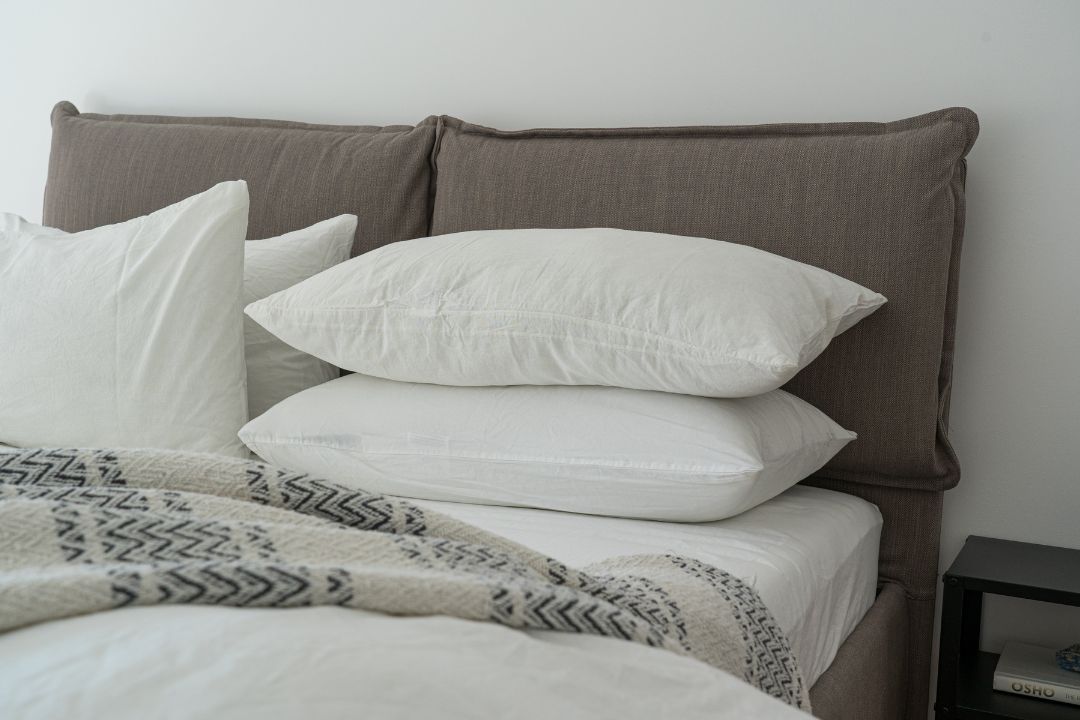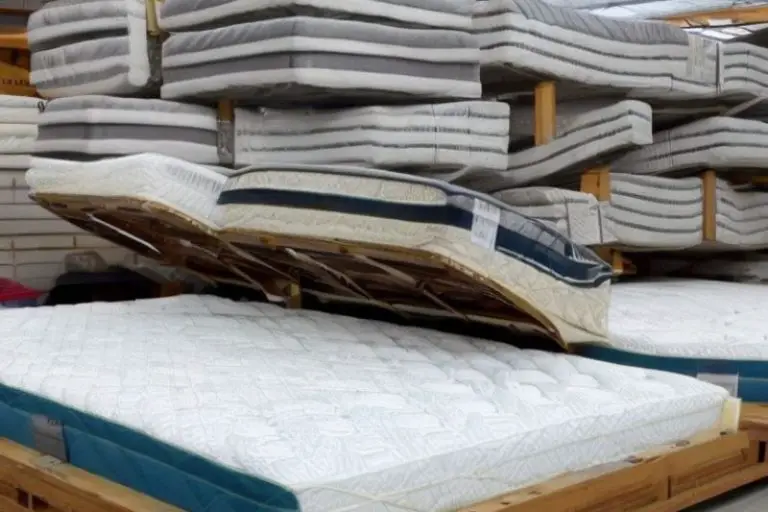Pillow Smell Like Cheese: (5 Ways to Get Rid!)

Have you ever experienced the unpleasant surprise of your pillow smelling like cheese?
It’s not a pleasant scent to encounter when you’re trying to get a good night’s sleep.
In this article, we’ll explore the possible reasons why your pillow might smell like cheese and what you can do to eliminate this odor.
Pillow Smell Like Cheese:
If a pillow smells like cheese, it’s likely due to bacteria or mold caused by moisture and sweat buildup. To resolve this, wash or replace the pillow following the manufacturer’s instructions. Regular cleaning and proper airflow can prevent unpleasant odors in pillows.
One possible cause of a pillow smelling like cheese is the accumulation of sweat and body oils over time.
As we sleep, our bodies naturally release sweat and oils, which can seep into our pillows.
If these substances are not properly cleaned, they can start to emit a cheesy smell.
Another culprit could be the presence of bacteria or mold, which thrive in dark and damp environments.
If your pillow is not adequately ventilated or if you live in a humid area, these microorganisms can grow and produce an unpleasant odor.
But don’t worry, there are solutions to this smelly problem!
In the following sections, we’ll discuss some simple steps you can take to eliminate the cheese-like smell from your pillow and ensure a fresh and clean sleeping environment.
So, let’s dive in and discover how to banish that cheesy aroma for good.
Why Does My Pillow Smell Like Cheese?
If you’ve ever noticed a distinct cheesy smell coming from your pillow, you’re not alone.
It may sound strange, but there are a few reasons why your pillow might have that funky odor.
Let’s take a closer look at some possible explanations:
- Sweat and Body Odor: Throughout the night, our bodies naturally produce sweat and oils, which can transfer onto our pillows. Over time, these substances can accumulate and create an unpleasant smell reminiscent of cheese.
- Bacteria and Fungi: Pillows provide a cozy environment for bacteria and fungi to thrive, especially if they’re not regularly cleaned. These microorganisms can break down sweat and oils, leading to the release of volatile organic compounds (VOCs) that contribute to the cheese-like odor.
- Mold and Mildew: Moisture can accumulate in pillows, especially if we sweat excessively during sleep or live in a humid environment. This excess moisture can create an environment conducive to mold and mildew growth, which can emit an unpleasant cheese-like smell.
- Food Residue: If you enjoy a bedtime snack in bed or accidentally spill food on your pillow, it can leave behind residue that attracts bacteria and fungi. As these microorganisms break down the food particles, they can produce odors resembling cheese.
To tackle the issue of your pillow smelling like cheese, here are a few tips:
- Wash your pillow: Follow the manufacturer’s instructions to launder your pillow regularly. This can help remove sweat, oils, and any bacteria or fungi present.
- Use a pillow protector: Consider using a pillow protector, which can act as a barrier against sweat, oils, and other substances that can cause odors. These protectors are often machine-washable, making them easy to maintain.
- Keep your sleeping environment clean: Regularly clean your bedding, including sheets, pillowcases, and blankets, to prevent the buildup of dirt, sweat, and oils.
- Ensure proper ventilation: Allow air to circulate in your bedroom by opening windows or using a fan. Proper ventilation can help reduce moisture levels, discouraging the growth of mold and mildew.
By implementing these practices, you can help keep your pillow smelling fresh and clean, without any cheesy surprises.
Remember, maintaining good hygiene and cleanliness can go a long way in ensuring a pleasant sleep experience.
Common Causes of Cheese-like Odor in Pillows:
If you’ve noticed that your pillow smells like cheese, you’re not alone.
This peculiar odor can be quite unpleasant and may leave you wondering why your pillow has taken on such a cheesy scent.
There are several common causes for this unusual aroma, and understanding them can help you address the issue effectively.
1. Sweat and Body Oils:
One of the most common causes of a cheese-like odor in pillows is the buildup of sweat and body oils.
Over time, our bodies naturally produce sweat and oils, which can seep into our pillows as we sleep.
These substances can provide a breeding ground for bacteria, resulting in an unpleasant smell similar to that of cheese.
2. Lack of Proper Ventilation:
Another factor that can contribute to a cheesy odor in pillows is a lack of proper ventilation.
When pillows are not adequately aired out, moisture can become trapped, creating an environment where bacteria thrive.
This can lead to the development of a cheese-like smell over time.
3. Fungal Growth:
Fungal growth is another potential cause of a cheese-like odor in pillows.
If your pillow has been exposed to moisture or damp conditions, such as from a spilled drink or excessive humidity, it can become a breeding ground for fungi.
These fungi can produce volatile compounds that emit an odor reminiscent of cheese.
4. Inadequate Cleaning:
Regular cleaning is essential to keep pillows fresh and odor-free.
If you neglect to clean your pillows regularly, the accumulation of sweat, body oils, and other substances can lead to a cheese-like smell.
Pillowcases should be washed at least once a week, and pillows themselves should be cleaned according to the manufacturer’s instructions.
In summary, the most common causes of a cheese-like odor in pillows are sweat and body oils, lack of proper ventilation, fungal growth, and inadequate cleaning.
By addressing these factors and maintaining proper hygiene, you can eliminate the unpleasant smell and enjoy a fresh and comfortable pillow.
5 Ways to Get Rid of the Unpleasant Odor:
If your pillow smells like cheese, don’t worry, you’re not alone!
It may seem strange, but this is actually a common problem that many people face.
Fortunately, there are several simple steps you can take to eliminate that unpleasant odor and enjoy a fresh-smelling pillow again.
Here’s how:
- Identify the source: Before you can get rid of the cheese smell, it’s important to figure out what’s causing it. Is it a spill, body sweat, or just accumulated dirt and oils? Identifying the source will help you choose the right cleaning method.
- Spot clean: If the cheese smell is only confined to a specific area of the pillow, spot cleaning might do the trick. Mix a solution of mild detergent and warm water, and gently dab the affected area with a clean cloth. Avoid soaking the pillow, as it may take a long time to dry completely.
- Wash it: If the entire pillow smells like cheese, it’s time for a thorough wash. Check the care label on your pillow for specific instructions, but most pillows can be washed in a machine. Use a mild detergent and set the machine to a gentle cycle. Adding vinegar or baking soda to the wash can also help neutralize odors.
- Dry it properly: After washing, make sure to dry your pillow thoroughly. Use a low heat setting in the dryer, or better yet, air-dry it outside in the sun. Ensure that the pillow is completely dry before using it again to prevent any musty odors from developing.
- Use odor absorbers: If the cheese smell lingers even after washing, you can try using odor absorbers to freshen up your pillow. Place a small bowl of baking soda or activated charcoal near the pillow, as these substances can help absorb and neutralize odors over time.
Remember, prevention is key to avoiding a cheese-scented pillow in the future.
Regularly washing your pillowcase, keeping your pillow clean, and using pillow protectors can help maintain a fresh and odor-free sleep environment.
So, don’t let a cheese-smelling pillow ruin your sleep.
Follow these steps to eliminate the odor and enjoy a fresh, clean pillow that smells nothing like cheese!
| Steps | Description |
|---|---|
| Identify the source | Figure out what’s causing the cheese smell |
| Spot clean | Dab the affected area with a mild detergent solution |
| Wash it | Follow care label instructions and wash the entire pillow |
| Dry it properly | Ensure the pillow is completely dry before using it |
| Use odor absorbers | Place baking soda or activated charcoal near the pillow |
Preventing Cheese-like Odor in Pillows:
If your pillow smells like cheese, you’re probably not having the most pleasant sleep experience.
But don’t worry, there are a few things you can do to prevent that unwanted odor and get your pillows smelling fresh again.
Here are some tips to keep your pillows smelling clean and free from that cheese-like scent:
- Wash your pillow regularly: One of the main culprits behind the cheese-like odor is the buildup of sweat, oils, and dead skin cells on your pillow. To prevent this, make sure to wash your pillows regularly. Check the care instructions on your pillow, as some may be machine washable while others may require hand washing.
- Use pillow protectors: Pillow protectors act as a barrier between your pillow and any sweat, oils, or other substances that can cause odor. These protectors can be easily removed and washed, keeping your pillows fresh and odor-free.
- Air out your pillows: Every once in a while, give your pillows some fresh air. Take them outside on a sunny day and let them air out for a few hours. This can help eliminate any trapped odors and keep your pillows smelling fresh.
- Avoid eating in bed: Eating in bed can lead to crumbs and spills on your pillow, which can contribute to unpleasant odors. To prevent this, try to avoid eating in bed or use a tray or napkin to catch any crumbs.
- Keep your bedroom clean: A clean bedroom can help prevent odors from accumulating in your pillows. Regularly vacuum your bedroom, wash your bedding, and keep the area around your bed tidy to minimize potential sources of odor.
Remember, prevention is key when it comes to keeping your pillows smelling fresh.
By following these tips and maintaining good pillow hygiene, you can say goodbye to that cheese-like odor and enjoy a more pleasant sleep experience.
| Tips to Prevent Cheese-like Odor in Pillows |
|---|
| Wash your pillow regularly |
| Use pillow protectors |
| Air out your pillows |
| Avoid eating in bed |
| Keep your bedroom clean |
Choosing the Right Pillow to Avoid Smells:
When it comes to pillows, we all want them to be comfortable and odor-free. After all, who wants to sleep on a pillow that smells like cheese?
To help you choose the right pillow that won’t leave you wrinkling your nose, here are a few tips:
- Materials Matter: Opt for pillows made from breathable materials such as cotton or bamboo. These materials allow better airflow, reducing the chances of smells lingering on your pillow.
- Natural Fillings: Pillows filled with natural materials like down or feathers are less likely to retain odors compared to synthetic fillings. Natural fillings have better breathability and can be easily aired out.
- Hypoallergenic Options: If you are prone to allergies or have sensitivities to odors, consider hypoallergenic pillows. These pillows are designed to repel common allergens and are often treated to prevent the growth of odor-causing bacteria.
- Washable Pillows: Look for pillows that are machine washable. Being able to wash your pillow periodically helps remove any sweat, dirt, or body oils that can contribute to unpleasant smells. Just make sure to follow the manufacturer’s instructions for washing and drying.
- Pillow Protectors: Using a pillow protector can be a game-changer in keeping your pillow fresh. These protective covers act as a barrier against sweat, spills, and stains, preventing them from seeping into the pillow itself. Pillow protectors are usually machine washable, making them easy to clean.
Remember, pillows are meant to provide comfort and support while you sleep, and nobody wants to rest their head on a stinky pillow.
By choosing the right pillow material, filling, and taking proper care, you can avoid that unwanted cheese smell and enjoy a fresher night’s sleep.
| Tips for Choosing the Right Pillow |
|---|
| – Opt for pillows made from breathable materials like cotton or bamboo. |
| – Choose pillows with natural fillings such as down or feathers. |
| – Consider hypoallergenic pillows if you have allergies or sensitivities. |
| – Look for pillows that are machine washable for easy cleaning. |
| – Use a pillow protector to prevent sweat, spills, and stains. |
The Importance of Cleanliness and Maintenance:
Maintaining cleanliness and practicing proper maintenance for your pillows is crucial for several reasons.
Not only does it contribute to a healthier sleeping environment, but it also helps to prolong the lifespan of your pillows.
Here are a few key points to highlight the importance of cleanliness and maintenance:
1. Hygiene and Allergens:
- Regular cleaning of your pillows helps to eliminate allergens, such as dust mites, dead skin cells, and sweat, which can accumulate over time.
- These allergens can cause respiratory issues, allergies, and skin irritations, especially for individuals with asthma or allergies.
- By keeping your pillows clean, you create a healthier sleeping environment, promoting better overall well-being.
2. Odor Control:
- Over time, pillows can develop unpleasant odors due to sweat, body oils, and bacteria.
- Regular maintenance, such as washing pillowcases and covers, can help control and eliminate these odors.
- Good hygiene practices, such as washing your face and hair before bed, can also reduce the transfer of oils and odors to your pillows.
3. Pillow Longevity:
- Regular cleaning and maintenance can extend the lifespan of your pillows.
- By removing dirt, oils, and sweat, you prevent the accumulation of residue that can degrade the materials and fillings of your pillows.
- Following manufacturer guidelines for cleaning and care can help ensure that your pillows remain supportive and comfortable for a longer period.
4. Comfort and Sleep Quality:
- Clean and well-maintained pillows provide better comfort and support, leading to improved sleep quality.
- Dirty or lumpy pillows can cause discomfort, neck pain, and restless nights.
- By keeping your pillows clean, fluffed, and in good condition, you can enjoy a more restful and rejuvenating sleep experience.
Remember, cleanliness and maintenance should be incorporated into your regular cleaning routine.
Follow the care instructions provided by the manufacturer, and consider using pillow protectors or pillowcases that are easy to wash.
By taking these simple steps, you can ensure a fresh and inviting sleep surface every night.
Conclusion: Pillow Smell Like Cheese
After thoroughly investigating the issue of pillows smelling like cheese, we have reached some interesting conclusions. Here’s a summary of what we’ve found:
- Not all pillows smell like cheese: While there have been reports of pillows emitting a cheesy odor, it is important to note that this is not a widespread phenomenon. The majority of pillows do not have this issue, and many people have never experienced such a smell from their pillows.
- Possible causes of the cheesy smell: For those who have encountered this peculiar odor, there are a few potential explanations. One possibility is the presence of bacteria or mold growth on the pillow. Another factor could be the materials used in the pillow, such as certain types of foam or synthetic fibers, which may give off an unpleasant odor over time.
- Prevention and solutions: To prevent your pillow from smelling like cheese, it is essential to maintain good hygiene practices. Regularly washing your pillowcase and pillow cover can help remove any bacteria or allergens that may contribute to the odor. Additionally, consider choosing pillows made from natural materials such as cotton or down, as they are less likely to develop an unpleasant smell.
- Seek professional help if necessary: If the smell persists despite proper cleaning and maintenance, it may be worth consulting a professional cleaner or even replacing the pillow altogether. They can provide specialized cleaning techniques or recommend alternative pillow options that are less prone to odor issues.







